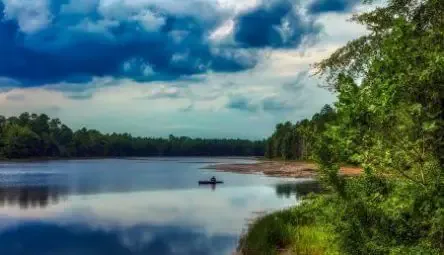The Garden State is one of the USA’s smallest states, but it’s packed with things to do. Whether you live in New Jersey or just visiting, you may not have heard of all of the prime fishing opportunities that the state has to offer, so we’ve decided to let you know about them.
In this guide, we’ll explore how you can get your hands on a New Jersey fishing license, and what to do once you have it. We’ll discuss the species of fish that you can expect to catch in New Jersey; then we’ll discuss some of the prime fishing spots that every angler needs to visit at least once.
How to Get a Fishing License in New Jersey
Like in any other state, you’ll need a fishing license before you decide to go fishing in New Jersey. 100% of the license fees are used by the US Fish and Wildlife Service to aid in conservation efforts as well as upkeep for state land that is used for fishing.
Who is Eligible for a Free Fishing License in New Jersey?
Certain individuals are eligible for free fishing licenses. If you are under 16 or over 70 years old, you won’t need a fishing license. You are also allowed to fish on your farm, provided you live there, or are a family member of the owners.
Some military service members are eligible for free fishing licenses, including active NJ National Guard and veterans suffering from a service-related disability. Active service members can pay for a license at resident rates, even if they haven’t lived in the state for the past six months consecutively, but they are not entitled to a free license.
New Jersey Fishing License Price
Residents have a few different options when it comes to getting a fishing license in New Jersey. The simplest method is to apply for a resident fishing permit, which will cost $22.50. The senior resident fishing permit is available for residents between 65 and 70, and it’s available for $12.50.
If you also hunt, you can also get your residential fishing license as part of the All Around Sportsman package for $72.25 per year. This includes the firearm hunting and bow hunting licenses, as well. Finally, to fish Trout, residents must also apply for a $10.50 trout stamp.
Non-residents can expect to pay a little bit more for their fishing licenses. Unlike residents, non-residents also have access to a 2-day and a 7-day vacation license, available for $9 and $19.50, respectively. The annual fishing license cost for a non-resident is $34, and a Trout stamp will cost non-residents $20.
All annual licenses last from the date of purchase to December 31st of that year.
Fish Species in New Jersey
Bass
New Jersey is home to several notable Bass species. The Largemouth Bass is particularly prevalent, and it can be found in most of the state’s waterways. Largemouth Bass will come out to the shallows during spring and fall, giving you an excellent opportunity to catch them. Bass are the most popular target for light tackle anglers.
Smallmouth Bass are also present in New Jersey’s waters, and they can easily be found during the fall when they school together and begin feeding to prepare for winter. A relatively rare species is the Striped Bass Hybrid, which is a cross between a White Bass and a Striped Bass.
Pike, Pickerel, and Muskellunge
The Northern Pike is a common species in the area, and it’s an aggressive fish that may be hard for beginners to reel in. These fish are great for catching and cooking, as they have savory flesh.
Chain Pickerel are related to the Pike, and they’re a common target for ice fishers. They are so-named because of the chain-like pattern that adorns their flanks.
The Muskellunge (also known as the Muskie for short) is the largest of these three related fish, and one of New Jersey’s most prized game fish species. New Jersey’s Muskies are renowned across the country for their impressive size.
Catfish and Bullheads
New Jersey also features quite a few Catfish and Bullheads, though only two species are prevalent enough to be notable. The largest Catfish species in the state is the Channel Catfish, and it makes for a popular trophy catch because of the massive sizes that it can reach. Channel Catfish are also prized for their meat, as they are delicious when fried.
Unlike the nonnative Channel Catfish, the Brown Bullhead has always resided in New Jersey’s waters. This species doesn’t grow to quite the same size as the Channel Catfish. Like most of their relatives, the best strategy is to go angling for Bullheads at night when they’re most active.
Crappie
The two species of Crappie in New Jersey are the Black Crappie and the White Crappie. Out of these two, the Black Crappie is more common, and it is considered a better catch. Crappies tend to school together, making them a great target for inexperienced anglers or those looking to refine their technique.
Crappies are most common during November and March, though these months don’t make for the most pleasant fishing conditions. During the early summer, they will tend to move to deeper water, as the shallows will begin to heat up and become less comfortable for them. If you like to catch and cook, Crappies have the added bonus of being delicious.
Other Fish Species
The Yellow Perch is another popular New Jersey game fish, and it’s typically targeted by ice fishers. Due to their pleasant flavor, Yellow Perch are prized by anglers who cook their catches.
Flatfish like Flukes and Flounders are also relatively common in New Jersey’s waters, and they’re relatively easy targets for beginner anglers.
Much like in the adjacent states, you’ll find plenty of Carp in nearly every waterway in New Jersey. These fish can grow to a maximum size of 40 pounds, and they’re tough fighters.
Yet another common fish type is the Sunfish, with Bluegills and Pumpkinseeds being the dominant varieties in New Jersey. Due to the uncomplicated tackle needed to catch them, Sunfish are popular with fishers who are just getting started. You’ll also find weakfish, bluefish, stripers, and several other species of fish all across the state, in smaller numbers.

Best Fishing Spots in New Jersey
The Raritan River
The longest river that only runs in New Jersey is the Raritan, and it culminates in the Raritan Bay. It is also one of the best spots to fish for Trout in the state. While both branches of the river contain plenty of Trout, the majority is stocked in the South Branch, so that’s where most anglers will congregate. The North Branch is stocked with slightly fewer Trout, but still a significant amount.
A good thing about the Raritan is that you don’t need a boat to fish from it, as you’ll find plenty of stable riverbanks to set yourself up on, and fly fishing is a popular technique here.
The Musconetcong River
Whether you’re there for a half day or a full day, you’ll enjoy some good fishing in the Musconetcong River.
The Musconetcong is a close runner up to the Raritan when it comes to Trout fishing, as this river also gets stocked annually. The New Jersey Wildlife Service releases an average of 50 000 Trout into this river per year, with the majority going into the river itself.
Along with these 50 000 fish, the Wildlife Service also releases around 1000 Trout into the Musconetcong Trout Conservation Area, which is a non-fishing zone. The Musconetcong is officially considered a National Wild and Scenic River.
Lake Assunpink
You can’t bring up fishing in New Jersey without mentioning Lake Assunpink, as it’s one of the best Bass fishing spots in the state. Of course, since this fact is well-known, it’s also one of the busiest places to go angling, and you’ll have to head there early in the season if you want the best chances.
Most anglers will come to Lake Assunpink in the evening, as this is when you’ll be most likely to catch the Bass that roam its waters. While the lake features a boat launch, it is restricted to electric boats only. Since the lake is quite shallow, an ideal boat would be one with a shallower draft.
Due to the popularity of Lake Assunpink, you’re likely to find fishing guide services available all around it. A guide service may increase the cost of your fishing trip, but it can also help your NJ fishing go a lot more smoothly.
Manasquan Reservoir
The Manasquan Reservoir doesn’t have the pedigree or the reputation of some of the other waters on this list, but what it does have is great sportfishing. The waters of the reservoir are well-stocked with various types of Bass, including Largemouths, Smallies, and even Striped Hybrids.
Since the lake has been relatively new, it has had some teething issues in the past, but it seems to have finally settled into the kind of ecological pattern you would expect. Since it’s still relatively unknown, the Manasquan Reservoir isn’t as heavily fished as Lake Assunpink.
Monksville Reservoir
The final spot on our list is the Monksville Reservoir, and it features a varied array of fish, including Walleyes, Muskies, and various types of Bass. The reservoir is quickly developing a reputation as an excellent Bass fishing spot.
Unfortunately, Monksville is a water supply reservoir, and it may be closed sometimes, so be sure to check before you pack up your gear and drive all the way over for nothing.
Conclusion
New Jersey is home to a variety of game fish, many of which are highly sought-after. The abundance of easy-to-reach waterways and the presence of these exceptional fish keeps this state at the top of any angler’s list.
While we mostly explored the freshwater fishing opportunities in New Jersey, keep in mind that you can do plenty of saltwater fishing along the Jersey Shore. Common saltwater fish in New Jersey include Albacore, Marlins, and other large fish species.
We hope that this guide has helped improve your fishing experience in New Jersey.



